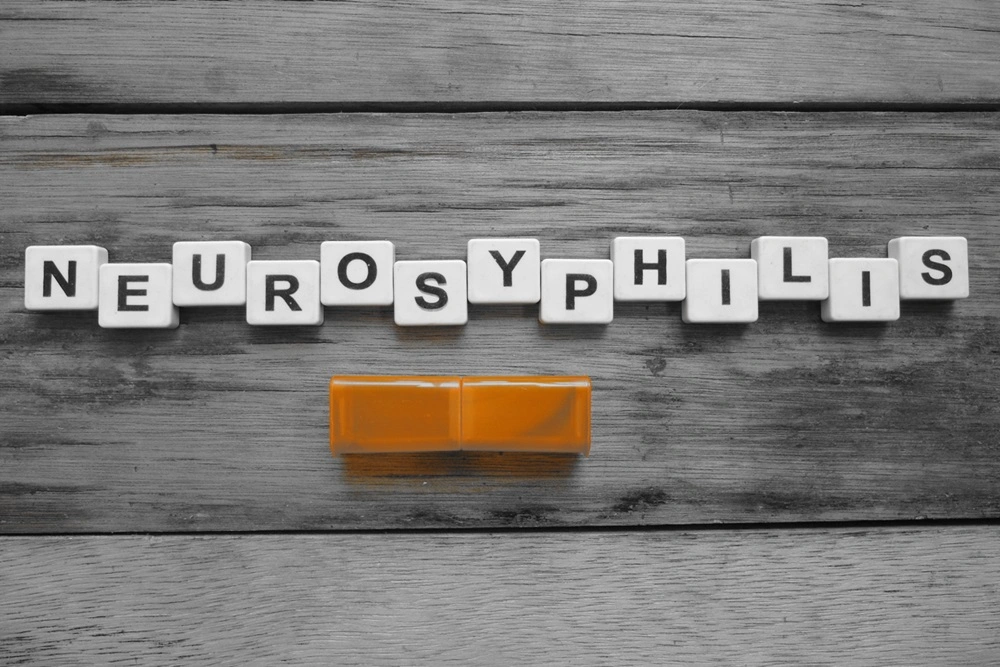When syphilis goes untreated, it can escalate and affect your central nervous system, including your brain and spinal cord. This condition is called neurosyphilis.
Here’s everything you need to know about this condition.
What is neurosyphilis?
Neurosyphilis is a complex and severe manifestation of syphilis, a sexually transmitted infection (STI).
When the bacterium spreads to your central nervous system, it may affect your brain and spinal cord. This condition can develop at any stage of syphilis and its manifestations can range from asymptomatic to severe neurological complications.
What causes neurosyphilis?
Neurosyphilis is caused by the bacterium Treponema pallidum, the same pathogen responsible for syphilis.
The infection is transmitted through direct contact with syphilitic sores, which can occur during sexual activity.
If you’re exposed to syphilis and it remains untreated, the bacterium can eventually spread to the central nervous system, leading to neurosyphilis.
What are the symptoms of neurosyphilis?
Since neurosyphilis impacts your central nervous system, here are the symptoms that you may experience:
- Headache
- Altered mental status
- Vision problems, including the risk of blindness
- Loss of coordination and motor function
- Sudden and severe dementia, in advanced stages
How is neurosyphilis diagnosed?
The testing methods for neurosyphilis include:
- Blood tests. These tests identify the presence of the Treponema pallidum bacterium and assess its impact on your central nervous system.
- Lumbar puncture or spinal tap. This method is performed by your healthcare provider to analyze cerebrospinal fluid for signs of the bacterium and inflammation indicative of neurosyphilis.
- Imaging tests. In some cases, MRI or CT scans are used to identify any brain abnormalities that could be associated with the condition.

What are the stages of syphilis?
Syphilis progresses through several stages, each with distinct symptoms and implications for your health.
1. Primary stage
This stage is characterized by the appearance of a single or multiple sores at the site of infection. Also known as chancres, you’ll notice that these sores are:
- Firm
- Round
- Painless
2. Secondary stage
When you have secondary stage syphilis, you may experience a skin rash and mucous membrane lesions, often accompanied by these symptoms:
- Fever
- Swollen lymph nodes
- Sore throat
3. Latent stage
In the latent stage, the infection remains in your body, but it doesn’t cause any symptoms. At this stage, you can go on with your day-to-day not knowing that you have syphilis while being infectious to others.
4. Tertiary stage
Being the most severe phase, having tertiary stage syphilis can cause serious health problems, including:
- Neurosyphilis
- Cardiovascular damage
- Gummas
How is neurosyphilis treated?
Once you’re diagnosed with neurosyphilis, your healthcare provider will put you on a treatment plan using intravenous penicillin G. This antibiotic is effective in eradicating the Treponema pallidum bacterium from the central nervous system.
For those allergic to penicillin, alternative antibiotics are prescribed so you can proceed with the treatment without compromising its efficacy.
What are the potential complications of untreated neurosyphilis?
Untreated neurosyphilis can lead to severe and irreversible complications that can affect multiple body systems and impair your quality of life.
These include:
- Severe neurological problems, such as paralysis and profound sensory deficits
- Cardiovascular damages, including aortic aneurysms
- Irreversible brain and nervous system damage
How can neurosyphilis be prevented?
You can prevent getting neurosyphilis by taking proactive measures against syphilis infection and making sure that it doesn’t progress to advanced stages.
Here are specific things that you can do to prevent this:
- Regular screening. This is important especially if you’re part of high-risk populations so you can detect the infection early.
- Safe sexual practices. Using condoms consistently can reduce the risk of acquiring STIs, including syphilis.
- Prompt treatment of syphilis. Aside from early detection, undergoing syphilis treatment promptly can help prevent its advancement to more dangerous stages and stop the development of the condition into neurosyphilis.
Frequently asked questions
What is neurosyphilis?
Neurosyphilis refers to an infection of the spinal cord and brain caused by the bacterium Treponema pallidum, the same organism responsible for syphilis. This condition can develop at any stage of syphilis if untreated.
How is neurosyphilis diagnosed?
Your healthcare provider may use testing methods such as physical examination, analysis of cerebrospinal fluid (CSF) through lumbar puncture, blood tests to detect syphilis antibodies and neurological imaging to identify any brain or spinal cord damage.
What are the symptoms of neurosyphilis?
Symptoms vary depending on the stage but may include headache, difficulty coordinating muscle movements, paralysis, sensory deficits and dementia. Early detection and treatment are crucial to prevent irreversible damage.
Can neurosyphilis be cured?
Yes, with prompt and appropriate antibiotic treatment, neurosyphilis can be cured. Penicillin is the most effective treatment. However, some neurological damage caused by the disease may be irreversible.
Is neurosyphilis contagious?
Neurosyphilis itself is not contagious, but syphilis, the underlying infection, is highly contagious and can be transmitted through direct contact with syphilitic sores during sexual activity or from mother to fetus during pregnancy.
Key takeaway
Neurosyphilis is a severe complication of untreated syphilis. By understanding its causes, symptoms, and preventive measures, you can prevent devastating neurological consequences and improve outcomes through proactive healthcare practices.
For your peace of mind, order a syphilis rapid test from our shop today.




















































